Text
Hello! I like how you brought up the importance of memory and building an identity. Everyone has their own form of memories that helps build up their identity, and nothing will be able to change that (unless they suffer from brain trauma or something similar). We can see in the film that memories play an integral role since they were not easily created nor retained by the main characters, which had an adverse effect on their relationship development. Later in the film, we can see that despite their amnesia and lost memories, their identities that were built of their memories were able to withstand the constant (literal) shift in time. Once this happened, they were able to reconnect and continue building their identities through shared memories.

Your Name is a film that goes beyond cultural and geographical boundaries, connecting with audiences everywhere. The story follows two teenagers, Taki and Mitsuha, who mysteriously swap bodies. This magical premise dives deep into themes of identity, connection, and the blend of personal and societal issues.
The film tackles several important issues within Japan and globally. One major theme is the rural-urban divide. Mitsuha’s life in a small, traditional town is starkly different from Taki’s fast-paced Tokyo life. This contrast reflects the ongoing struggles many Japanese towns face due to urban migration, leading to depopulation and cultural loss. Globally, it mirrors the challenges of preserving cultural heritage amidst rapid modernization. Another significant issue is disaster preparedness. The comet disaster in Your Name is reminiscent of real-life events like the 2011 Tōhoku earthquake and tsunami. It highlights the importance of memory and collective effort in overcoming such tragedies, a theme that resonates worldwide in an era of increasing natural disasters.
On a personal level, the film brings up feelings of nostalgia and a longing for connections that go beyond time and space. The idea of swapping bodies and lives, even temporarily, makes you think about the nature of empathy and understanding. It made me reflect on the everyday challenges and joys that others experience, deepening my appreciation for diverse perspectives.
Michel Foucault’s “The History of Sexuality” offers a unique way to analyze Your Name. Foucault’s method emphasizes the historical and social construction of identities and the power dynamics involved. In Your Name, the body-swapping can be seen as a metaphor for the fluidity of identity and how personal and social histories shape our experiences. The characters’ struggles with their new identities reflect Foucault’s idea that identity is not fixed but is continuously constructed through discourse and power relations.
10 notes
·
View notes
Text
Little Things #22: Your Name
I find it ironic that I began this course watching a critically acclaimed anime film I had heard was iconic. Now, I have finished the course with another widely acclaimed anime film that is also iconic for anime fans worldwide. I think it is just a full circle at this point, a nice little conclusion that marks the end (or even start?) of my anime analysis journey.
As expected with a heavily respected movie, it is no surprise that the art style that was displayed throughout the movie was a feast for the eyes. The colors, the cinematography, the fluid-like movements made by the characters... I could honestly watch the movie without subtitles or in the English dub so I can just enjoy watching the pictures moving across the screen. However, if I did that then I would not be able to even understand what the film's storyline was and why it is impactful. The main premise of the film is on two teenagers Mitsuha Miyamizu and Taki Tachibana who suddenly gain the ability to swap bodies with each other after they have expressed dissatisfaction with their current lives. Usually, this plot line is cliche (Lookism I'm looking at you (get it?) but I love you so I am choosing to ignore it), but the twist is that Mitsuha is from three years in the past in a rural area in Japan while Taki is living in the modern world three years in the present while also being in Japan. What is even more interesting is that the main characters are unable to remember the other's name and struggle to remember why they are familiar with the other person, but they will for some reason never be able to find the reason why they feel as if they are missing a part of themselves. So throughout the movie, the two try to live their lives in the other person's body, eventually meeting the other and finding purpose (as well as love for the other), and saving Mitsuha from dying in a meteor strike.
What I like about the anime is how they demonstrate aspects of love that are not discussed in today's society. Usually, when discussing love in entertainment, the characters long to be physical, and while emotions play a role, physical attraction and contact are still widely sought after. Your Name is the opposite of the standard romance film since the main focus of its story is the transcendental connection between the two characters and their yearning to be with each other. It is the familiarity of knowing the other's existence but not knowing why, the only thing you can make of this is that the person should be instrumental in your life, but why? This unique take on love and the emphasis on familiarity over physicality is what sets the movie apart from others of the same genre. I think that everyone should watch the movie and hopefully find their own "missing link".
(PS. I also had fun writing all of these blog posts for the past week, even if they stressed me a little bit lol)
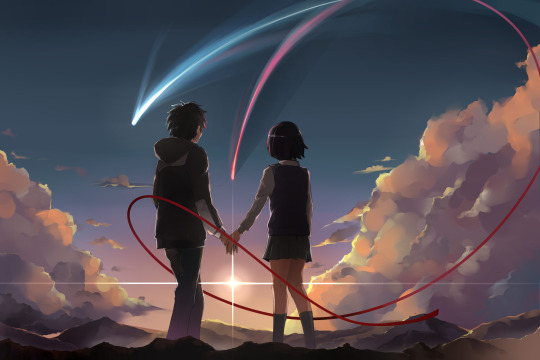
2 notes
·
View notes
Text
Hey! I found your takes on the anime quite hilarious and I agree with your sentiment on how portraying the countries to be cutesy and dumbed down is quite insensitive. I also remember watching a scene where Germany was "fighting" in WWII and was operating a canon and was complaining about missing his target (or it could be another country shooting, it's been a while since I watched the series), and then Italy and Japan were there to just cheer him on. Again the time period was around the WWII era, so it is crazy for countries to be lightly complaining and joking about missing their targets when in reality millions of innocent lives were being taken on the daily. Yet if we ignore the fact that the Hetalia characters represent literal countries, it is a fun watch. (PS. Japan was my fav and I'll defend him-)
Blog Post - Hetalia ᯓᡣ𐭩‧₊˚ ⊹
GIRL WHAT THE HELL WAS THIS SHOW!!! ITS SO GOOFY! I always forget that CountryHumans: The Anime exists, but when I do remember it, I always wish I could forget it again. Hetalia is pretty silly, but it gets kinda weird when you think about it for more than five minutes. I can recognize that it succeeds as a massive parody to make fun of real-world powerhouses and how much they don't attribute to the world besides violence. But, the show turns whole-ass countries into buff or twink men and lowkey encourages their fans to ship them with one another. No wonder the Hetalia fandom turned out to be so crazy.
However, one choice I didn't really like was when the creators cutie-fied the events of World War 2 from the perspective of the Tripartite Pact. I think it's a bit insensitive, especially for how infamously evil German and Japanese forces were during that time. I think if the show wanted to create shenanigans between personified countries in the present time that would be fine. But having a tiny stranded beach episode with Germany, Japan, and Italy while both sides of the war tortured and murdered thousands in real life during fights, concentration camps and sieges is just. Again, kinda weird. I don't wanna know that Germany is good at tying shoelaces right now!!! But maybe the show just wasn't my cup of tea, I could see how others can get behind it.
If I put to the side that all the characters were countries, Hetalia was a lot more enjoyable. But I think it was an odd choice to have this for our last anime in the class. This anime could've paired so well with Genshiken as a real-life example of toxic fandoms within anime communities. Both shows deal with the balance of good gay representation and dangerous representation from BL, but adding the representation of countries on top of that could've been super interesting to compare! But I understand why it was paired with Kobayashi's Sensōron instead.
But anyways, this is my last blog of the class! Yay!!! Pasta!!!
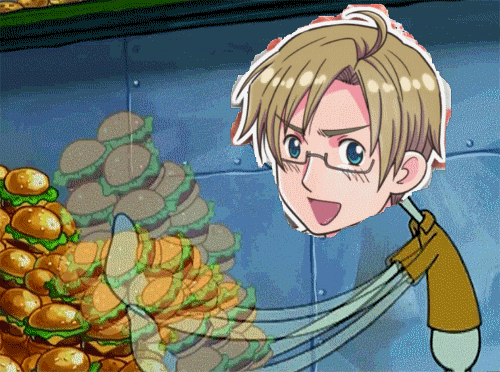
13 notes
·
View notes
Text
Little Things #21: Hetalia: Axis Powers
When I was looking over the course syllabus at the beginning of the semester to gauge the different anime series and films that we were supposed to watch, you would not believe my immediate shock when I saw the title Hetalia. I was immediately taken back to 2021 during winter vacation sophomore year, specifically on New Year's Eve. I remember chilling in my bed watching Hetalia in my newly renovated room while listening to the fireworks outside my house. Since I was still just starting out watching anime and I had heard of people liking Hetalia, in my innocence, I decided to watch the series (ended up binging the entire series and the side content as well). It was really interesting to watch human countries as a premise to portray different historical events and in this case with Hetalia: Axis Powers regarding the Holocaust. Now, in hindsight, was Hetalia stereotyping real-life countries and their people which in general is something that is sure to be frowned upon? Yes. Did I care at that time? No, because it was a fun watch and I was bored at the time.
Looking back on it I can now point out that while I was watching the series, I had no idea that the countries (Germany, Italy, and Japan) were grouped up in a war for World War II. I thought the plot was just countries hanging out with each other (which is probably pretty funny now that I think about it). The creator of the series really simplified the historical events that appeared during WWII and how the different countries responded to it, and this was labeled as a problem to some people. The reason for this can be due to how the creator essentially simplified tragic events like the Holocaust by making it all cutesy and unserious, which may translate as mocking the genocide. The anime also interestingly presents nationalism in that it mocks the countries' flaws and exaggerates them for comedic relief. Despite these critiques, I still enjoyed watching Hetalia: Axis Powers and I even consider the time I watched this anime along with other notable animes one of my fondest high school memories.
(PS. My favorite Hetalia character was Japan I don't care what anyone else says.)
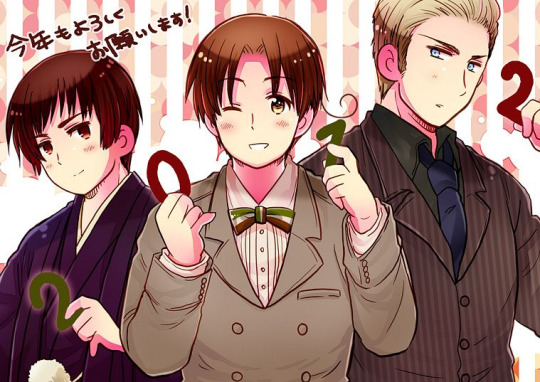
0 notes
Text
I really appreciate how simply you were able to summarize the main plot of the game's storyline. I thought I was going crazy trying to understand what the main problem was and how the characters were attempting to solve it. However, I also agree with how this video game takes a unique perspective in that nature and humans are truly interdependent and not humans relying on nature but nature does not need humans. It is a fresh take on how both humanity and nature should coexist with no need to dominate the other. As long as we are able to respect each other's roles in the world, we should be able to achieve at least some form of peace.
XenoBlade Chronicles 2

I've heard a bit about this game before so I thought it was an interesting pick for the class. The anime is a clear cut comment on the relationship between humanity and nature. Basically, Klaus destroys the entire world and is trying to rebuild it. He uses nanobots and the titans in order to achieve this restoration. Humanity is clearly struggling with the absence of nature and would have completely died off if it wasn't for Klaus creating the titans. Humanities depictions of Heaven or “Elysium” is basically just a place that has nature within it. After living in a world absent of nature, humanity's greatest wish is simply to return to it. It comments on today's world that is actively harming nature. It's easy to destroy nature but hard to rebuild, and once it's gone, you'll wish you never destroyed it. So, we should preserve nature, so there is never a point in time where humanity is threatened by the absence of it.
What's interesting is that unlike in Nausicaa, it seems that nature has no way of naturally healing itself. Nature is completely reliant on Klaus and his plan in order to regenerate. Nausicaa gives the idea that nature can live independently without us but that we cannot live without nature. Xenoblade makes it seem that we are intereliant on each other. Personally, I think nature being capable on its own makes more sense from a current standpoint. We'd really have to mess up the world, for nature to not be able to survive without us. Ultimately, our job as humans is to simply not prevent nature from doing its purpose and preserving itself.
Anyways, like I said before Xenoblade is a clear comment on humanity's relationship with nature. We shouldn't harm nature for our own greed. We are reliant on nature to survive.
15 notes
·
View notes
Text
Little Things #21: Xenoblade Chronicles 2
Personally, I have never heard of the Xenoblade Chronicles series. I am not much of a gamer (unless the game is Wizard 101, in that case, I will not claim master level at it, but I am familiar with the gaming lore) so I might be unable to fully commentate on how good of a role-playing game this series is. On the other hand, I heard that Xenoblade Chronicles is a popular computer game and that most gamers who are into this genre have at least heard of the game. I also find it strange how we are reviewing a video role-playing game in an anime class, but maybe there are just some hidden similarities between video games and anime that I am unaware of. Ultimately, this game is centered around a God-like character known as Klaus, or the Architect, who has mistakenly destroyed all the nature in the world and is desperately trying to revive it. He uses nanobots to speed up nature's regeneration and has given the humans who lived in the world Titans (who might all be dragons?) who are basically glorified floating houses.
It is interesting to note that in this world, even though humans are once again causing the problem of nature's extinction, we are truly struggling with trying to revive it. You would think that nature would just do its own thing and just fix itself, but instead it is heavily reliant on whether humanity can solve its own problems. It really changes the perspective on whether nature is as self-sufficient as we like to think it is. I am pretty sure that in real life nature would just bounce back and prosper without human intervention if destroyed, but what would happen if this is not the case? What if the only way nature will ever recover from reckless human actions is that is humans to come together and unite under the common goal of restoring the global environment? I would like to be optimistic about these sorts of things but I have a hard time believing that nature would survive if that was the case.
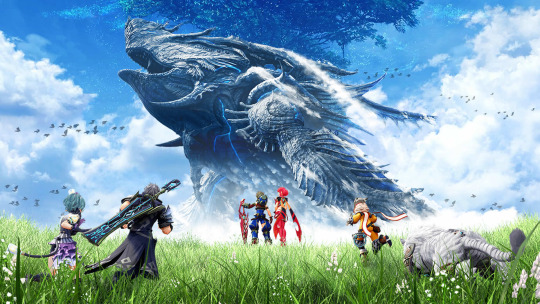
0 notes
Text
A fellow film art style enjoyer! I would like to say that even though learning about how we need to come together and unify against a common goal (such as global warming) is important, I am unable to quietly dismiss how beautiful the art is. You read the word "apocalyptic wasteland" and you would think of nuclear sludge everywhere, smoke rising in billows, no signs of human life, but in Nausicaa's world, it is quite the opposite. The ecosystem is vibrant despite all the mutations of the insects and plants. I think a possible message that the director was trying to share is that nature will always restart and prosper, so humans must follow their example in tribulation.
Nausicaa of the Valley of the Wind
Another Hayao Miyazaki film!! The first one we saw this semester was Spirited Away, so it’s cool to see an even earlier film by the same director. Technically Nausicaa is pre-Ghibli but it’s BASICALLY Ghibli too (honorary sibling status, if you will). Nausicaa revolves around a world that’s destroyed itself through nuclear war and is populated with small livable areas. The rest of the world, other than these areas is basically a scary Jurassic Park-esque insect nightmare. The main character, a princess named Nausicaa, is someone that’s always had a deep connection with the natural world. In a world where the natural world is seen as incredibly hostile (I mean, in fairness, it can be), this is abnormal and she not only has to be a leader to her people but be a leader in the sense of reconnecting humanity with the natural world.
I notice a common theme with a lot of the anime we’ve watched is some kind of post apocalyptic or dystopian theme. And usually it’s because humanity massively messed up in one way or another. This time it’s because we’ve essentially had a nuclear holocaust that spawned super bugs. I think it’s interesting how usually the protagonist who ends up creating change is someone young who basically has the responsibility thrust onto them by necessity.
On another completely different note, it’s cool to see the Ghibli style before it was officially Ghibli. Obviously Miyazaki is one of the most (if not THE most) well known anime directors out there, and after I’m done with this class I may sit down and go through his filmography to kind of see what I notice. I think something about Ghibli that really stands out is that it is drawn in an anime/manga style but the production value looks higher than some other animes, it doesn’t shy away from showing compositing but the line art and stuff looks crisper.
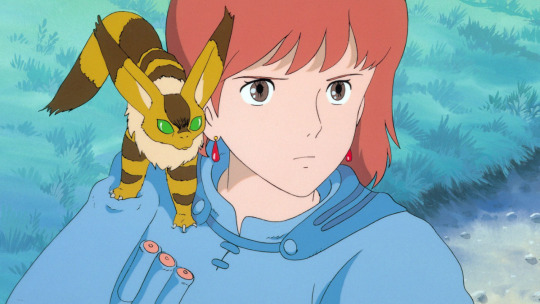
3 notes
·
View notes
Text
Little Things #20: Nausicaa of the Valley of the Wind
I quite enjoyed Nausicaa of the Valley of the Wind; it is a cute anime about how we need to respect nature and not ruin it. I especially like Nausicaa since she is not only brave but is willing to stand her ground for her beliefs. Typically, in older anime films, the women are usually timid and pose as damsels in distress. Still, Nausicaa rejects that common trope in favor of fighting against her enemies and not being afraid of damaging her body if it means that she can preserve the fungal forest and her hometown valley. Yet, despite this, I am fairly surprised at the worldbuilding of the movie. You would think that a total nuclear war would wipe out all of humanity and all the other living organisms, leaving only burnt debris and lasting fires. I sometimes wondered throughout the anime how the surviving humans lasted this long and could reproduce when essentially all necessary resources were either vanquished or unusable.
I also appreciate the message that the creator tried to share with the audience that we need to protect nature and not fight over its resources or for other petty reasons. I know that in reality, this feat will be practically impossible since at this point pretty much every country around the world is involved in some conflict regarding resources and who bears the right to claim ownership of the limited materials. There is also constant damage being done to natural wildlife as large corporations prioritize growing their own profit margins and not ethically disposing of their toxic sludge safely away from vulnerable wildlife. I believe that this message needs to be shared with all who are willing to hear it. We need to come together and stop the useless fighting since we are heading nowhere. Only self-destruction is waiting in the distant future if we do not change our intercontinental priorities to end global issues, such as global warming.
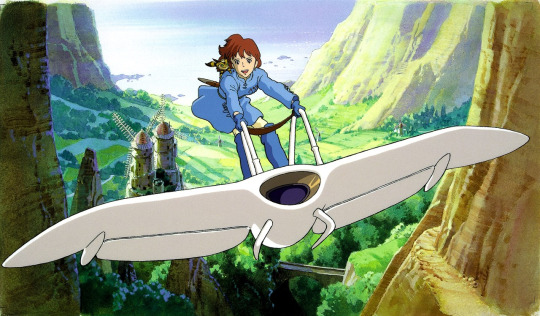
0 notes
Text
Hi, while I enjoyed reading your analysis, I might have to disagree with your interpretation that Shinji was able to overcome his self-imposed limitations in favor of avoiding being alone. While being forever alone is something that most humans would want to avoid, Shinji takes a proactive stance in trying to avoid this fate, but he eventually becomes too scared to face the harsh realities of his environment as well as face himself on why he constantly pushes people away. He self-destructs and concludes at the end of the film that if he is unable to find human connection in the world, the world must cease to exist, which includes him. I agree with your point that he abandons his queer masculinity for a hegemonic persona, and that aids in the destruction of humanity to become unified. Even after he changes his mind and wishes to become human again, he still reverts to his normal timid self as he strangles Asuka in hopes of escaping his problems, forgoing true human connection in place of violence.
End of Evangelion Blog Post
This was kinda sad to watch. I can tell it was the fear of isolation, nature of human consciousness and the yearn for an identity that was prevalent throughout this entire anime. While continuing to address pressures of societal expectations, the film delved more so into Shinji’s internal conflicts where society s now portrayed as a place in which individuals must explore tensions between personal desires and collective responsibilities. In his case, it is his queer masculinity vs his hegemonic one. Audiences worldwide reflect on their lives and shape their struggles accordingly. The fear of losing oneself is something all individuals struggle with while simultaneously trying to create a human connection with others in such an interconnected world.
As someone who is dictated at times with the fear of rejection, this anime hit home. It invites me to introspect into my life and the way I go about creating human connections and learning more and more about myself too. The emotional and psychological depth to this film was very clearly and properly explored in my opinion. It makes me wonder where I should start in attacking my barriers to better embrace and welcome genuine connections into my life. It is no surprise by now that Shinji’s character challenges notions of masculinity by embodying a vulnerable and emotional personality. This complexity contrasts with rigid gender norms and we see that all Shinji wants is to be accepted and embraced for who he is. You know it’s bad when he starts behaving in a hegemonic way that can get him accepted, but it goes against his morals and character. The ending made me happy, and I am glad to see his character develop throughout this all as it brought him to life in a way. He was able to come to terms with himself and with society which is all he had ever yearned for.
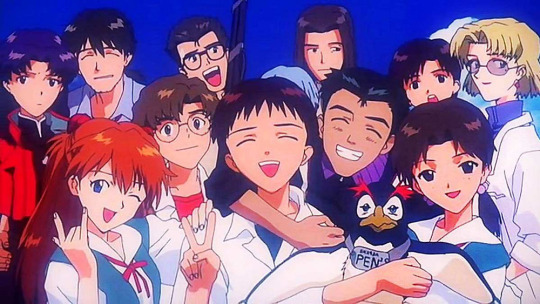
3 notes
·
View notes
Text
Little Things #19: The End of Evangelion
Once again, I can confidently say that I was perplexed and mind-jumbled after watching The End of Evangelion movie. I will say that I did enjoy the art style and the creative directing after seeing how the creators showed their artful mastery as they displayed the beginning of the end where humanity combines as one (I think). Since I barely understood what I was seeing in the movie, I watched a quick summary of the final film and I was finally able to get the gist of the animated plot. Essentially, the movie poses as an alternative dark ending to the previous ending of the TV series Neon Genesis Evangelion in which the hopeful ending was hinted at. The final episode of the series shows that Shinji ultimately overcomes his depression and self-hatred in favor of saving humanity from the doomsday cult's advances. The film shows the reality of the world if Shinji chose not to save humanity and instead continued to run away from owning up to his responsibilities as an Evangelion warrior. He feels trapped since he claimed that whenever he tried to help, he instead either hurt himself or others around him. Henceforth, he decides that if he does nothing and avoids interfering, then someone will eventually solve his problems so can continue to live in ignorance.
The movie serves as a complex and intriguing cautionary tale of how complacency in one's life should be avoided if we are destined to achieve bigger goals. We are also encouraged to not constantly feed our minds into our delusional desires or else it will separate humanity's connection with each other, pitting us against each other to a point of no return. In fact, some people say that the reason why the film containing the alternative ending even exists is because Evangelion fans were unhappy with the unrealistic happy ending that was the original ending in the series. The original creator of the series was also struggling with depression and after reading a psychology book on the human self, he wanted to respond to the worldwide backlash that he was receiving for the first ending by distinctly referencing how we need to forgo the delusions that we feed ourselves to counter disunity. So in actuality, the series creator was able to put his ideas and theories into fruition in reality.
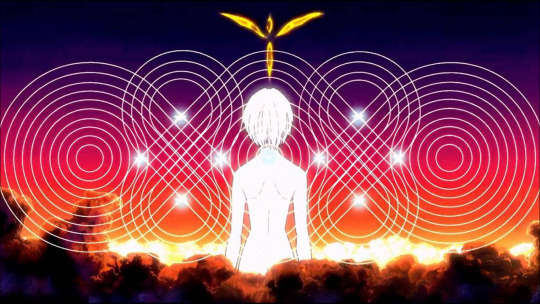
0 notes
Text
Hi, I appreciate your effort in breaking down the main flaws of the characters, even if you were confused. From the other blog posts I've read so far for Neon Genesis Evangelion, the show requires some letting go of logic in favor of exploring complex themes that are too varied to simplify. I think this is one of the series' strengths because they makes the characters more realistic and understandable of their struggles. By taking Shinji for example, the creators didn't make him your typical cool, calm, and collected anime protagonist, but instead gave us a representation of a person who would naturally have a mental breakdown over the accumulated stress from the alien invasion and their responsibilities as a hero. I'm surprised Shinji hasn't fallen on the deep end since he essentially has no one he can trust or understand him.
Evangelion Part 2

Alright Part 2 is where I can actually get to writing. I wrote my part 1 blog almost entirely on Shinji so I'll start off by explaining what I meant by his “character development” that I mentioned in my last post.
Those last 2 episodes were probably super confusing. They probably felt like they came out of nowhere. Some people say it's an amazing ending, while others say it's horrible. Honestly, I don't know how I feel about it. I even needed the help of redditors to get a semi-understanding of what it meant without having the movies spoiled for me. Basically these two episodes are all about Shinji's self hatred and at the very end he comes to finally accept himself. Really, it seems to be that simple. Of course, I haven't watched the movies yet, so if there's more to it, that's probably why.
Honestly, I knew that Shinji hated piloting the Eva, but I feel that we don't get a true understanding of his self-hatred until these last two episodes. You can say this is dumb, because it may seem like the writers just suddenly had Shinji hate himself, but personally I feel that the story had some obvious hints along the way. When people yelled or even hurt Shinji, he never defended himself. He always avoided problems. Someone who hates themselves, doesn't have the power to protect themselves.
Alright, I should probably talk about some other characters. Rei still confuses me and I'm betting there's more info In the movies because it seems she has some connection to Shinji's mother. Rei's character development is basically her smiling and shedding a tear. She's attempting to find her humanity and sense of self even though she knows she is different from everyone else.
Asuka says she's piloting the Eva for herself, but in reality she pilots the Eva as a coping mechanism for her mother. Her mother never cared for her, and the chance to become an Eva pilot meant that people would always care for her, unlike her mother. She believes that if she isn't the best, people will stop giving her attention. She believes that she'll lose any value she has. As of the ending of the series, Asuka is still in a depressive state, but I'm assuming she'll get back on her feet in the movies.
Finally, I'll talk about Misato Katsuragi. At first, she just seems to be this strong, independent, happy, snobbish, beautiful lady. However, we later find out that she's dealing with some serious trauma of her own. Her dad, who she originally hated, sacrificed his life to save her. It left her confused as to whether she hated her dad or not. She unintentionally sought out things that reminded her of him such as her job and her boyfriend to fill the void left in her heart. At the end of the series, it seems to point out that she is scared of being alone. Her dad leaves her. Her boyfriend leaves her. She just wants anyone's attention and even seemingly makes a move on Shinji.
Hopefully y'all didn't seriously read all 500+ word yapping session, but part 2 was definitely where the phique of the characters was delved into more. As for my opinions on Evangelion (before watching movies), I liked it, but I don't really understand the hype.
23 notes
·
View notes
Text
Little Things #18: Neon Genesis Evangelion Part 2
*lights go off in the bathhouse"
Shinji: It is time to go to bed.
Kaworu: ...with me?
Out of all of the episodes for Neon Genesis Evangelion, I had to watch for this assignment, episode 26 had to be one of the funniest yet confusing episodes so far. Start off with the fact that we get this iconic scene towards the beginning of the episode up until we find out that Kaworu is actually an angel that wants to die in order to save humanity, we are offered new insights into Shinji's character. We know that Shinji holds the heavy responsibility of protecting humanity from the "angel" monsters, but we also learn that he actively runs away from confronting the truth about his trauma. He is still traumatized from the near-death experiences that happened to him and his teammates as well as some of the lies that he was fed about the true nature of the monsters up until this point in the series. In fact, due to the insistent lying from the people he trusts the most, he is beginning to form trust issues with people which results in social anxiety that does not help his overall situation. His mental state plummets even more once he realizes that the person he has started to care for the most, Kaworu (who says that he loves him which is another topic for another day), states that he chooses to die despite being immortal to protect humanity, but Shinji should always choose life and protect humanity before attempting to destroy the military hideout.
With all these major events happening in Shinji's life, it is no wonder that he is always running away from his problems and always apologizing for things that has no control over. It is his defense mechanism since that is the only way in which he feels like he can take control over how he feels and acts without it being dictated by anyone. Yet just like Kaworu in the series, he will not be able to hide forever and he must face the truth at some point.
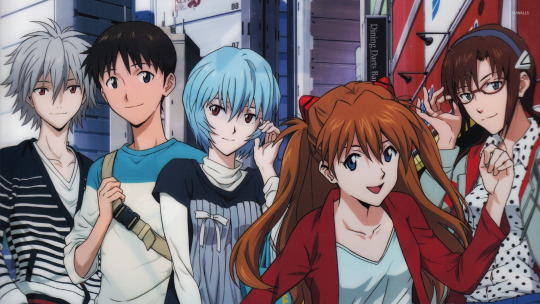
1 note
·
View note
Text
Hey! I think that your point on how Shinji is alone due to his responsibilities and that no one will be able to understand his problems is something that needs to be expanded on in discussions about the series more often. I feel like this also ties into how in the anime's society, traditional men are usually expected to internalize their problems and moments of weakness. They are expected to be alone all the time because of their "alpha male" status of being the lone wolf and guide their society throw turmoil successfully. Shinji is trying to do exactly that but while doing so he is increasing his burdens and trauma yet he is unable to reach out for help since that will place doubt on his societal status.
Finally, Peak Fiction (Neon Genesis Evangellion Pt.1)
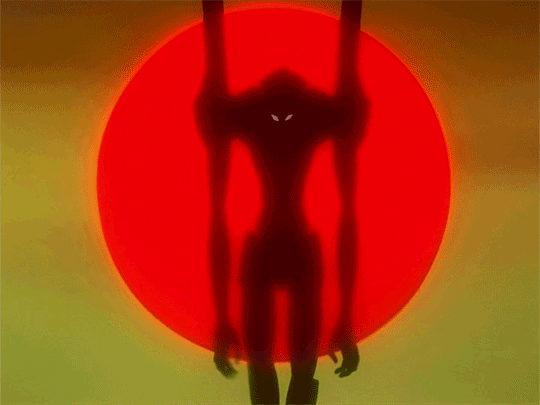
Let me preface this by saying that this is one of my favorite anime of all time and I have already watched the whole show once before along with the End of Evangelion movie and the revamp movies that were made recently on Amazon Prime. So obviously, I recommend to everyone to continue watching this show if you enjoyed it. I even have a poster of Eva 01 on my wall.
Anyway, this show explores loneliness in though all of its main characters and its first and most explored is Shinji Ikari. Sinji isn't the most masculine, nor brave. Despite that, he is virtually forced into piloting the Eva. The immense pressure of not only being responsible for your own life but preventing the end of the world is debatably too much for any one person to handle, especially a timid 14-year-old boy. This is shown most prominently in episode 3 where Shinji stops angel Shamshel with only seconds to spare, Shinji is understandably visibly shaken. Because of whom he is and what he does Shinji still remains isolated, this quote form episode 3 exemplifies that too from Misato "Well, he'll eventually learn that growing up means getting closer to people and distancing them, finding a distance where you can avoid hurting each other too much."
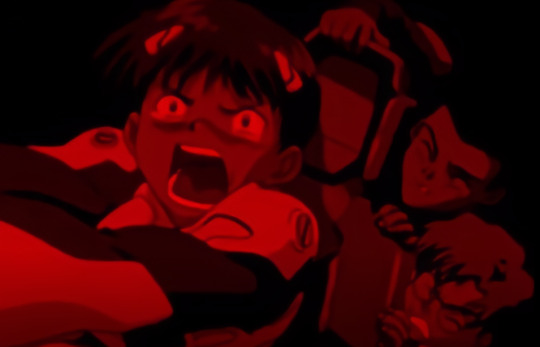
Brutally alone, Shinji escapes his isolation through music. The, while pessimistic, perspective of Misato remains true to Shinji especially, nobody can relate to his own struggle and those who can are equally distant. He's not an always determined hero, nor is he stoic enough to keep his personal struggle inside of him, and too wimpy himself to face his problems without fear, making him an normal kid stuck with the weight of the world on his shoulders. Another thing to point out is the Christan symbolism in the show. Every angle is a real character in the bible (for example Shamshel is a gaurdian of the Garden of Eden after Adam and Eve are banished, serving as a metaphorical example of how in NGE the angles prevent Shinji from living his own life) or that the name Neon Genesis Evangelion can be seen as the beginning (Genesis is 1st chapter in the bible) of the end (Evangelical translates from Greek to "good news" the good news is rebirth after death or revelation for believers) of the future (neon associated with future). Taking that the beginning of the end of the future is in the title serves as massive foreshadowing of something more to come. Very happy to be watching one of my favorite shows!
6 notes
·
View notes
Text
Little Things #17: Neon Genesis Evangelion
So far, after watching the required episodes for Neon Genesis Evangelion, I have come to the realization that I, in fact, have no idea what is happening. All I know is that aliens are attacking the people in Tokyo and that the government (more distinctly one of its major military leaders) is forcing Shinji Ikari, a fourteen-year-old boy who is also the son of the army leader, to pilot a dangerous giant war robot, the Evangelion, in hopes of saving humanity from a large alien invasion. The situation itself is messed up because they are forcing a young child to essentially fend society from the "Angel" on his own. It is also obvious that he is too scared and reluctant to take the large role of a war soldier, but because he is so desperate for his father's validation and since the previous pilot of the war robot is injured, Shinji has no choice but to take the role.
What I like about the anime so far is that it shows the reality of war-ridden environments, morals and ethics are thrown out of the window. Furthermore, in moments of severe unrest, it is usually the men's job to protect the most vulnerable. This mindset can be pointed out during the scene where Shinji's dad tells him that he will be piloting the Evangelion without hearing what he has to say in response. He claimed that Shinji "finally had a use" in society and that he should make it his priority, referencing his role as one of society's protectors as a man in a society that has strict standards for the traditional genders. There are also instances where he was told to "act like a man" and "be a man" when he showed "lesser" emotions like fear, cowardice, and selfishness. In the story's society (and in reality too), we place unnecessary expectations on the traditional male and female roles and are quick to ridicule anyone who fails to meet those expectations, even if they are unfairly enforced.
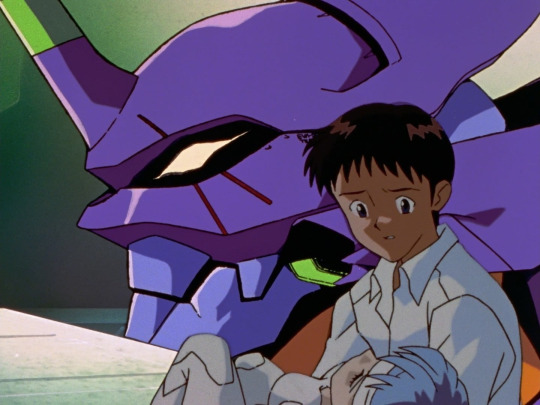
1 note
·
View note
Text
Wow, it seems like you had a lot of fun at the convention! I also really like your Batman cosplay and the part where a little boy ran up to you for a photo must have really been touching. I know that if I was at a convention cosplaying and someone asked me for a photo I would definitely be flattered. Reading about your experience at MegaCon makes me really want to attend an anime convention. Seeing the vendors selling exclusive merchandise and displaying their art while musical artists and voice actor panels are lighting the mood, it seems like going to a convention is something that all otaku and comic book fandoms should attend at least once just for the experience.
MegaCon 2022 !!! ( I'm Batman )
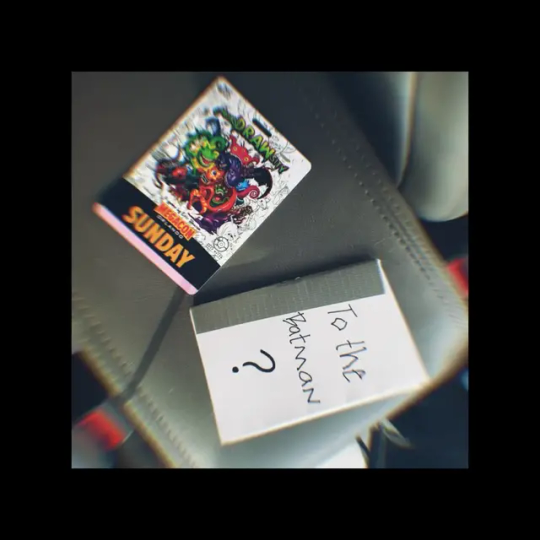
The most recent convention that I’ve been to was MegaCon (2022) in Orlando. It was more comic book based, but there were many different fandoms and genres present. The venue was a really massive building that had multiple rooms for showings, small parties, and interactive areas. I’m pretty sure there was a small Vocaloid concert in one of the rooms as well. The main attraction of course was the main room where all the booths were set up. As I walked through the convention, I was able to appreciate just how much these fans had elevated the media to more than just entertainment.
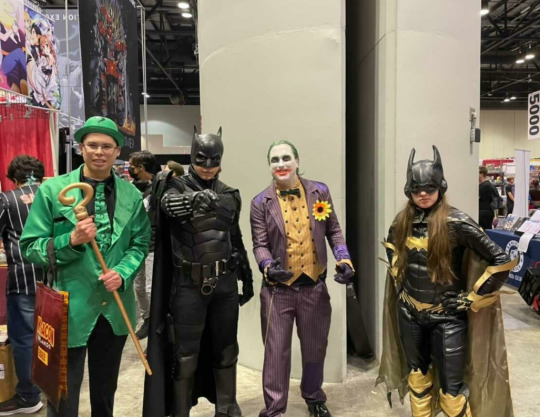
First, there’s the place itself. The giant open hall was divide into multiple sections, such as the retail area, the artist alley, the celebrity booths, and the food courts. The retail area was mostly people selling props like ninja blades or things of the sort, body pillows, masks, shirts, cards, etc. It was a lot of merch for a variety of mediums including comics, anime, games, and movies. The other main attraction for me was the artist alley. It was just a very large area lined up with booths and booths of independent artists. It ranged from their own personal art to art of characters from beloved series. It was not just a commercial thing, but also a display of the huge variety in artistic styles. I saw spray paintings, watercolor on paper, acrylic accessories, metal pins, stickers, hand drawings, sculptures, and so much more. Personally, I got a My Hero Academia sticker of my favorite character (lemillion), a watercolor ghostface poster, and a metal pin of Calcifer (from Howl’s Moving Castle) for a friend that couldn’t be there. I think it’s really amazing how all of these fans are able to produce so much due to their love for these franchises. Sure, it has become a huge business that can earn someone a living. However, it’s the way that fans are able to physically possess this fiction that is so cool to me. The characters come to life in a way, jumping out of their source material to be presented by us in the real world in unique ways. It adds an interactive layer to the entertainment we all love. Relating to this extra layer, I didn’t even talk about the cosplaying and voice acting yet.
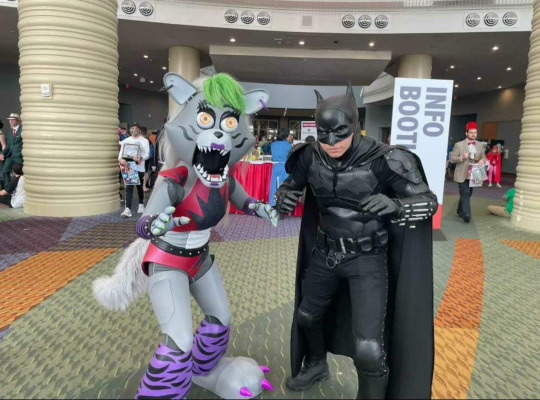
Walking around the con, I saw so many different cosplays that I recognized. Spiderman characters, DC villains like the Riddler and joker, Tanjiro from Demon Slayer and others from the series, Five Nights at Freddy’s characters, and so much more. I went dressed as Batman (the Robert Pattinson version) and had a blast. So many people came up to me to take pictures and tell me how cool my costume looked, and some even treated me as if I was the real batman and roleplayed a little. My favorite part was when a little boy (probably 10) came up to me in his own batman costume and took a picture with me. It was just very wonderful to see how the community was so positive and having fun. It really felt like a space where everyone could express themselves however they wanted and be encouraged instead of judged. It was also cool to learn about how people put together their cosplays, as a lot of them were hand-made or modified. One more thing that was awesome was the fact that there were a lot of voice actors and popular cosplayers that showed up. The most notable of these, for me, was Kevin Conroy (the iconic voice of batman in the animated series and the games). Being able to meet the person who voiced one of your favorite characters, as well as seeing all the cosplays around you, really makes you feel like the fiction has come to life. It’s also very validating to see other people enjoy these characters and shows as much as you do. Overall, it was an amazing experience that I will definitely do again.
3 notes
·
View notes
Text
Big Things: Otaku Conventions
Personally, I have never been to an anime convention before. I know they are a staple in anime and manga fandoms alike, but I was never really interested in going to one for a few reasons. One reason was when I first started to watch anime it was in 2020, and I am not sure if you all are aware, but a little virus known as Coronavirus-19 was pretty big back then. Everything was on lockdown and there was minimal fan gathering movement that these people who usually held the conventions can do. Due to this, I was never able to learn about these conventions and how people enjoyed participating in them. Another reason was that I was going through a difficult time in my life that left me jaded enough to not care for these events since I was more prone to feel isolated if I saw other people enjoying themselves without a hint of worry (depressing I know but I am doing better now). Currently, however, after watching the documentary, I now know how amazing and inviting anime conventions can be. The cosplay, the voice actor panels, and countless vendors selling hand-made goods took time and dedication that was shown in the otaku documentary and had me question why I had never gone to one before. Two reasons for this are probably…well…money and time, but other than that, why not?
In the documentary, the reporter walked around asking attendees what made them want to attend anime conventions and even dedicate their time to cosplaying, and many people exclaimed how they wanted to be seen for their interests. They wanted to engage in a community that encouraged their interests and, in fact, fan them even more by constantly engaging in creating pieces of fan art, recreating iconic costumes worn by popular anime characters, creating fan theories about different storylines, and more. In the case of cosplayers specifically, I remember there was an attendee of an anime convention who mentioned that if she were to dress up as an anime character and walk down a street, she would be considered as weird by those who see her. She would have been mocked and her sanity would be questioned since it is not really common that people would walk down a street looking like they just hopped out of an anime series. But when she is at a convention? No one bats an eye to the way she looks. Even more so, if she was wearing an impressive cosplay costume then she would be praised for her fashion and encouraged to keep practicing her craft. This is what anime otakus crave - acceptance acceptance in a community. They don't want to be chastised for their hobbies (I mean who would?), it is not their fault that anime was not popular at that time (compared to now) and relatively unheard of. That would not stop them from creating their own gathering places and activities. The otaku communities would hold their own conventions like the one in the documentary, Anime Expo, ComicCon, etc for all otakus, by otakus.
I admire them since they are so passionate about their favorite stories and characters, so much so that I now want to attend one. I learned through other blog posts and UF forums that UF holds its own smaller-scale anime convention known as SwampCon in the spring. I am planning on attending just as a spectator since I want to get a taste of what an anime convention is all about. Plus, it would be a good starting point and a good gage on whether I would want to attend a bigger anime convention in the future.
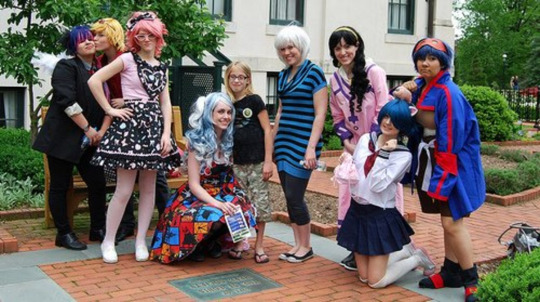
0 notes
Text
Hi! I like how you mentioned how feeling uncomfortable in one's skin and not feeling part of a larger society is a universal problem that most people experience at least once in their lives. Society is an ever-changing dynamic of rules and customs, and even though we are becoming more accepting towards people like the LGBTQ+ and other people who defy social norms, there is still a lingering feeling of disconnect and disunity towards the perceived "outsiders" and the rest of the people. We can try to combat these feelings by bridging the generational conflict between the parties and ensuring that those discriminated against and excluded people are heard and understood. We need to take the steps necessary to create a more inclusive future so that no one feels the need to hide who they are or stand for.
Wandering Son
Unique story that challenges monolithic gender performance.
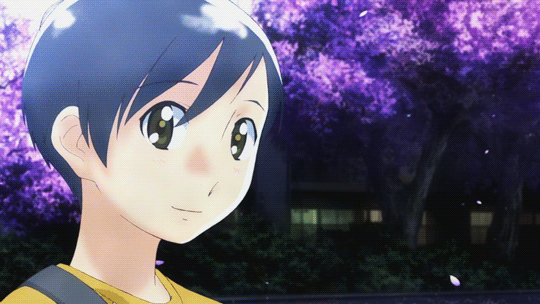
This anime follows Shuichi Nitori who we see is a fifth grader who wans to be a girl. Nitori befriends Yoshino Takatsuki who tells Nitori that she wants to become a boy, the two support each other with their goals. The story follows them both at school and out of school, life how there challenging the monolithic gender performances, and the challenges they face all the way up to them entering middle school. They also meet with a local transwoman who supports both Nitori and Takatsuki goals or for lack of better words performances they wish to take. The challenges they face is the acceptances, and bullying they face in school and how others see them as being able to be fixed. Most notable we have Nitori's sister who wants to set him up on a date, but all Nitori wants is to feel comfortable in her body.
The themes that we've seen in both sailor moon and aggretsuko are shown here and even challenged. Why cant a boy wear girls clothing and a girl wear boy clothing, though it maybe viewed as simplistic it challenges what society has established as the social norms in both genders and gender roles.
These issues are more abundant throughout the world and Japan. Not being comfortable in one's own skin, questioning your existences and being able to be accepted by the world around you based on you choices is a struggle that most of these individuals in this series face. But in the real world I'm sure there are more people that are struggling with the same challenges. It brings out the issues of descrimination, though not as severe as we've seen in previous animes, it still addresses these significant issues. I personally cant relate to these issues. Overall this anime isn't my cup of tea, and i say this solely because i like my animes to have more action, or adventure, animes that are written like this are good for people, but don't necessarily capture my attention, to go out of my way to view it.
1 note
·
View note